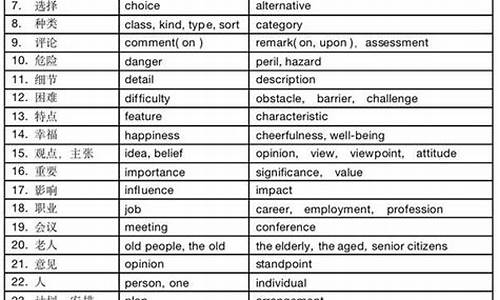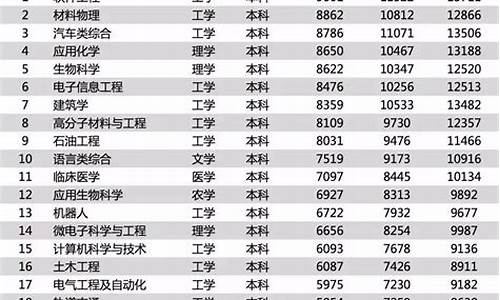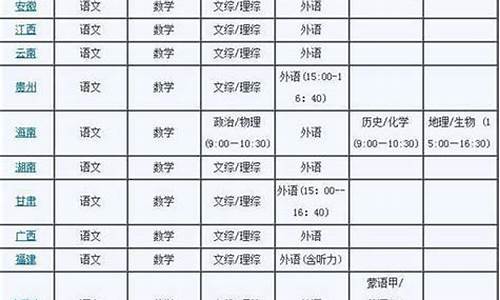您现在的位置是: 首页 > 教育比较 教育比较
高考基本词汇400个动词,高考词汇动词
tamoadmin 2024-05-18 人已围观
简介l.动词+about\x0d\ speak/talk about 谈论 think about 思考\x0d\ care about 关心,对有兴趣 bring about 引起,使发生\x0d\ set about 着手,开始 come about 发生\x0d\ hear about 听说

l.动词+about\x0d\ speak/talk about 谈论 think about 思考\x0d\ care about 关心,对有兴趣 bring about 引起,使发生\x0d\ set about 着手,开始 come about 发生\x0d\ hear about 听说 worry about 为担心\x0d\2.动词+away\x0d\ throw away 扔掉 blow away 吹走\x0d\ carry away 拿走,使入迷 clear away 清除掉,消散\x0d\ die away 逐渐消失,减弱 pass away 去世\x0d\ wash away 冲走 take away 拿走,使消失\x0d\ put away 收拾起来,存起来 give away 背弃,泄漏,赠送\x0d\ wear away 磨掉,消耗 break away 摆脱\x0d\ send away 让走开 turn away 把打发走\x0d\3.动词+back\x0d\ keep back 隐瞒,忍住 look back(on) 回顾\x0d\ hold back 控制住 give back 归还\x0d\ call back 回电话 take back 拿回,收回\x0d\4.动词+for \x0d\ run for 竞选 ask for 要求得到\x0d\ wait for 等候 stand for 代表,表示\x0d\ long for 渴望 hope/wish for 希望得到\x0d\ care for 关心,喜欢 beg for 乞求\x0d\ search for 查找 look for 寻找\x0d\ call for 需要,要求 hunt for 寻找\x0d\ change?for 用换 charge?for 收费,要价\x0d\ apply for 申请 take?for 误以为是\x0d\ seek for 寻找 come for 来拿,来取5.动词+down\x0d\ burn down 烧毁 break down 坏了,垮了,分解\x0d\ take down 记下,记录 turn down 调小,拒绝\x0d\ cut down 削减,砍倒 slow down 慢下来\x0d\ pass down 传下来 put down 记下,写下,镇压\x0d\ calm down 平静下来 bring down 使降低,使倒下\x0d\ settle down 安家 come down 下落,传下\x0d\ tear down 拆毁,拆除\x0d\6.动词+at\x0d\ come at 向袭击 shout at 冲(某人)嚷嚷\x0d\ run at 冲向,向攻击 work at 干活动(研究)\x0d\ tear at 用力撕 look at 看,注视\x0d\ stare at 凝视 glare at 怒视\x0d\ glance at 匆匆一瞥 laugh at 嘲笑\x0d\ knock at 敲(门、窗等) point at 指向\x0d\ smile at 冲(某人)笑 strike at 向打击\x0d\ aim at 向瞄准 shoot at 向射击\x0d\ wonder at 惊讶 call at 拜访(地点)\x0d\7.动词+from\x0d\ differ from 与不同 suffer from 受苦\x0d\ hear from 收到来信 die from 因而死\x0d\ keep/stop/prevent?from阻止 learn from 向学习 \x0d\ result from 由于 date from 始于时期 \x0d\ separate?from 把分离开 \x0d\8.动词+of\x0d\ think of 想到 dream of 梦到\x0d\ consist of 由组成 speak of 谈到\x0d\ approve of 赞成 die of 死于\x0d\ talk of 谈到 hear of 听说\x0d\ complain of 抱怨 become of 发生情况,怎么啦\x0d\9.动词+off\x0d\ start off 出发 set off 出发\x0d\ leave off 中断 show off 炫耀\x0d\ get off 下车 take off 脱下,起飞\x0d\ see off 送行 ring off 挂断电话\x0d\ put off 延期,推迟 come off 脱落,褪色\x0d\ cut off 切断,断绝 fall off 跌落,掉下\x0d\ keep off 避开,勿走近 go off 消失;坏了,爆炸,不喜欢\x0d\ knock?off 把撞落 break off 打断\x0d\ pay off 还清 carry off 携走带走,赢得\x0d\ get off 脱下(衣服等) give off 散发出\x0d\ turn(switch) off 关掉\x0d\10.动词+on\x0d\ depend on 依靠 rely on 依靠\x0d\ insist on 坚持 carry on 继续,进行\x0d\ keep/go on 继续 spend?on 在花钱\x0d\ put on 穿上,戴上,上演 call on 拜访\x0d\ move on 继续移动,往前走 live on 以为生\x0d\ feed on 以为生 bring on 使发展\x0d\ take on 雇用,呈现(新面貌等) try on 试穿\x0d\ have on 穿着 pass on 传授,传递\x0d\ look on 旁观 turn(switch) on 打开\x0d\11.动词+out\x0d\ break out 爆发 point out 指出\x0d\ pick out 选出 figure out 算出,理解\x0d\ burst out 进发 bring out 阐明,使表现出\x0d\ carry out 执行,进行 help out 救助\x0d\ hold out 坚持下去 set out 出发,着手,摆放\x0d\ wear out 穿破,使疲劳 turn out 结果是,生产,培养\x0d\ make out 理解,看清楚 come out 出版,出来\x0d\ cross out 划掉 leave out 省略,删掉\x0d\ keep out(of) 使不进入,挡住 work out 算出,想出办法等\x0d\ find out 查出,弄明白 give out 散发,分发,用完\x0d\ try out 试用,试验 look out 当心,提防\x0d\ put out 扑灭 speak out 大胆讲出\x0d\ hand out 散发 send out 发出,派遣\x0d\ run out 用完 go out 熄灭\x0d\ let out 泄漏,发出(声音),出租 die out 灭绝\x0d\12.动词十in\x0d\ give in 让步 hand in 上交\x0d\ bring in 引进,使得到收入 drop in 拜访\x0d\result in 导致 succeed in 在获成功\x0d\ join in 参加 take in 接纳,吸收,改小\x0d\ get in 收获,进入 break in 强制进入,插话\x0d\ fill in 填写 call in 召集,来访\x0d\ cut in 插入 persist in 坚持\x0d\ look in 来访,参观\x0d\13.动词十into\x0d\ look into 研究,调查 turn into 变成\x0d\ burst into 闯入,进发 divide?into 把分成\x0d\ change?into 把变成 put/translate?into 把译成\x0d\ run into碰到 send sb to/into sleep 使进入状态\x0d\14.动词+over\x0d\ turn over 翻倒,细想 think over 仔细考虑\x0d\ go over 审阅,检查,研究 look over 翻阅,检查\x0d\ get over 克服 run over 压死,看一遍\x0d\ take over 接管,接替 watch over 看守,照看\x0d\ fall over 跌倒,摔倒 roll over 翻滚\x0d\15.动词十to\x0d\ belong to 属于 object to 反对\x0d\ refer to 谈到,涉及,参阅 point to 指向\x0d\ turn to 向求助,查阅 stick/hold/keep to 坚持,忠于\x0d\ see to 处理,料理 come to 共计,苏醒\x0d\ reply to 答复 get to 到达\x0d\ bring to 使苏醒把比作 compare?to 与?相比;把?比作\x0d\ agree to 同意 write to 写信给\x0d\ supply?to 为提供 lead to 导致,通向\x0d\ add to 增添 attend to 处理,专心,照料\x0d\ devote?to 贡献给\x0d\16.动词+up\x0d\ grow up 成长,长大 give up 放弃,献出\x0d\ build up 建立 set up 架起、建立\x0d\ put up 搭起,架起,安装,住宿,张贴,盖起\x0d\ do up 整理,包装,打扮 \x0d\ go up 增长,上涨get up 起床,站起 \x0d\ pick up 拾起,学会,用车,来接,收听到\x0d\ bring up 抚养,呕吐,提出 出现\x0d\ turn up 开大(音量等),出席\x0d\ stay up 挺住,熬夜\x0d\ take up 开始学,从事,占据\x0d\sit up 熬夜 eat up 吃完\x0d\ use up 用完 tear up 撕碎\x0d\ lay up 储存 make up构成,组成 编造 弥补\x0d\ cut up 切碎 join up 联结起来,参军\x0d\ end up 总结 come up 上来,长出,出现\x0d\ speed up 加快速度 throw up 呕吐\x0d\ clear up 整理,收拾,放晴 look up 查找,找出\x0d\ bum up 烧毁 catch up 赶上\x0d\ hurry up 赶快 fix up 修理,安排,装置\x0d\ keep up 保持 hold up 耽搁,使停顿\x0d\ send up 发射 ring up 打电话\x0d\ open up 开创,开辟 divide up 分配\x0d\ break up 分解\x0d\17.动词十through\x0d\ get through 通过,干完,接通电话 \x0d\ look through 翻阅,看一遍,仔细查看\x0d\ go through 审阅,检查,学习 \x0d\ put?through 接通电话 see through 识破 \x0d\ check through 核对 pull through 渡过危机,康复\x0d\18.动词+with\x0d\ deal with 处理,对付 do with 处理,需要\x0d\ meet with 遇到,遭受 talk with 同交谈\x0d\ agree with 同意,与一致 compare with 与相比\x0d\ combine with 与相联合 equip?with 以装备\x0d\ cover?with 用覆盖 begin with 以开始\x0d\ end up with 以结束 supply?with 以供给\x0d\ provide?with 以供给 play with 玩,玩弄\x0d\19.三词以上的短语动词\x0d\ add up to 总计 break away from 摆脱\x0d\ keep away from 避开,别靠近 do away with 废除\x0d\ look down on 轻视 look up to 仰望,尊敬\x0d\ put up with 忍受 catch up with 赶上\x0d\ keep up with 赶上 run out of 用完\x0d\ make up for 弥补 go on with 继续\x0d\ get on(along) with 和相处 look forward to 盼望\x0d\ get close to 接近 take hold of 握住\x0d\ get out of 逃避,避免 get down to 认真开始\x0d\ set fire to 放火烧 pay attention to 注意\x0d\ take notice of 注意 set an example to 为榜样\x0d\ do well in 在干得好 pay a visit to 访问\x0d\take a photo of 拍照片 take the place of 取代
高考英语应该掌握的不及物动词
英语中按动词后可否直接跟宾语,可把动词分成及物动词和不及物动词。
不及物动词:字典里词后标有vi. 的就是不及物动词。不及物动词后不能直接跟有动作的对象(即宾语)。若要跟宾语,必须先在其后添加上某个介词,如to,of ,at后方可跟上宾语。具体每个动词后究竟加什么介词就得联系动词短语了.
常用的不及物动词 appear ,Appear calm come ,Come easy (safe)
go ,Go mad (crazy, bad, sour, wrong, crazy, hungry, blind) get ,Get angry (ill, wet, excited, married, paid) fall ,Fall asleep( fall ill, fall short, fall flat) feel ,Feel good (sleepy) keep ,Keep quiet (silent) look ,Look fit (well, young, tired)
make, Make certain (sure, ready, a good teacher) prove ,Prove an effective method (correct, accurate) remain ,Remain still (unchanged) rest,Rest satisfied (content) rise, Rise red seem ,Seem happy stand ,Stand still
stay ,Stay young (stay fresh, the same) turn, Turn teacher =become a teacher (yellow) turn out ,Turn out true 用法举例
Look carefully! (注意:carefully 是副词,不是名词,故不作宾语) look at 看…….+宾语 Look at me carefully! (me是代词,作宾语) (at是小范围 in是大范围)
如: The students work very hard.学生们很努力地学习。 She apologized to me again. 她再次向我道歉。
The accident happened yesterday evening.昨天晚上发生了事故。 与及物动词的区别
及物动词与不及物动词的区别从是否需要宾语来分,实义动词分为及物动词和不及物动词两类。
1)及物动词 后面必须跟宾语意义才完整的实义动词,叫做及物动词(transitive verb)。如: I believe that the committee will consider our suggestion.我相信委员会将会考虑我们的建议。
“How long can I keep the book ?”Harry asked.哈里问:“这本书我可以借多久?” 2)不及物动词 本身意义完整后面不须跟宾语的实义动词,叫做不及物动词(intransitive verb)。如: Birds fly.鸟会飞。
It happened in June 1932.这件事发生于一九三二年六月。 My watch stopped.我的表停了。
She spoke at the meeting yesterday evening. 她在昨天晚上的会上发了言。 3)兼作及物动词和不及物动词 英语里有不少实义动词可以兼作及物动词和不及物动词。这样的动词又有两种不同的情况:
a)兼作及物动词和不及物动词时,意义不变。试比较: Shall I begin at once?我可以立刻开始吗?(begin作不及物动词)
She began working as a librarian after she left school.她毕业后当图书馆管理员。(begin作及物动词)
When did they leave Chicago?他们是什么时候离开芝加哥的?(leave 作及物动词) They left last week. 他们是上周离开的。(left 作不及物动词) b)兼作及物动词和不及物动词时,有时意义不尽相同。如: Wash your hands before meals.饭前要洗手。 Does this cloth wash well? 这布经得起洗吗?
4) 与汉语的比较 有时英语动词的及物和不及物的用法,与汉语的用法不一样,请注意下列两种情况:
a)有的动词在英语里只能用作不及物动词,而汉语则可用作及物动词,如arrive到达,agree同意,1isten听。英语里这些动词后面常接介词。如:
We arrived at the railway station at noon.我们于中午到达火车站。(at不能省去)(比较:We reached the railway station at noon.)
Everybody listened to the lecture with great interest.每个人都很有兴趣地听讲课。(to不可省去)(比较:We all heard the lecture.)
Do they agree to the plan?他们同意这个计划吗?(to不可省去)
b)有的动词在英语里能用作及物动词,而在汉语里则不能用作及物动词,如serve为…服务。 Our children are taught to serve the people wholeheartedly.我们的儿童被教以全心全意为人民服务
及物动词后可以加宾语,不及物动词后不可以加宾语
动词的及物不及物是在英语学习中必须解决的首要问题。动词及物与不及物通常有以下几种情况:
a.主要用作及物动词。及物动词后面必须跟宾语。可以用于:"主+谓+宾";"主+谓+双宾";"主+谓+宾+宾补"结构。如:
He reached Paris the day before yesterday. Please hand me the book over there. They asked me to go fishing with them.
类似的还有:buy, catch, invent, found, like, observe, offer, prevent, promise, raise, find, forget, receive, regard, see, say, seat, supply, select, suppose, show, make, take, tell.... b.主要用作不及物的动词。不及物动词后面不跟宾语。只能用于:"主+谓"结构。 This is the room where I once lived.
类似的还有:agree, go, work, listen, look, come, die, belong, fall, exist, rise, arrive, sit, sail, hurry, fail, succeed....
c.既可以用作及物又可以用作不及物的动词,其意义不变。如begin 都是作"开始"讲。everybody , our game begins. let us begin our game.
类似的还有:start, answer, sing, close, consider, insist, read, learn, prepare, pay, hurt, improve....
d.既可以用作及物又可以用作不及物的动词,其意义完全不同。
这类动词作不及物动词是一个意义;而作及物动词时却是另一个意义。如lift作不及物动词时是指烟雾的"消散"。we saw the mountain when the clouds lifted. 作及物动词时是"升高;举起"。 He lifted his glass and drank.
类似的还有:beat vi.跳动 vt. 敲、打; grow vi.生长 vt. 种植 play vi.玩耍 vt. 打(牌、球),演奏 smell vi.发出(气味) vt. 嗅 ring vi.(电话、铃)响vt.打电话 speak vi.讲话 vt. 说(语言) hang vi. 悬挂 vt. 绞死 operate vi.动手术 vt. 操作 需要注意的一点是:少数不及物动词唯一可跟的宾语是同源宾语,如:I dreamed a dream last night.
一些动词应用中只能用主动表示被动。
1、 Need, want, require(要求,需要), deserve(应得,值得), be worth值得),not bear(经不住) 后面接doing主动表被动。
The book is worth reading. 这本书值得一读。
The old building requires repairing. 这座古建筑需要修了。
These young seedlings will require/need looking after (=need to be looked after) carefully.?这些幼苗将需要小心的照管。 Your hair wants/needs cutting (needs to be cut).?你的头发该剪了。
2、不定式作定语,放在被修饰词后面,与前面被修饰的名词或代词有动宾关系,又在句子中与另一名词或代词有主谓关系,不定式要用主动表被动含义。
I have much work to do. 我有许多要做的事情。(与work有动宾关系,与I有主谓关系) Tom is looking for a room to live in. Tom在找一间住的房间。(与room有动宾关系,与Tom 有主谓关系)
He has a family to support.?他要维持一个家庭。(与family有动宾关系,与he有主谓关系) 3、不定式修饰作表语和宾语补足语的形容词时,结构:主语+系动词+形容词 + 不定式; 动词+宾语+形容词+不定式。如果形容词是表示难易、利弊等含义,如
difficult, easy, comfortable(舒适的), convenient(便利的,方便的), hard, cheap, expensive, 等,不定式用主动表被动。
The question is difficult to answer. 这个问题很难回答。 The work is easy to do. 这项工作很好做。
I found the car comfortable to ride in. 我觉得这种车很好坐。 That makes poetry difficult to write. 那就使得诗很难写。
4、在be to结构中的一些不定式:这种结构中的不定式通常应用主动表被动。下列动词用不定式的主动形式表示被动意义: Who is to blame for starting the fire?这场火灾应由谁负责?
You are to blame for the accident. 你应为这事受动责备。 The house is to let.此房出租。
A lot remains to do.还剩下许多事情要做。
5、系动词没有被动形式,但有些系动词常表示被动意义。常见的有taste(吃起来), sound (听起来), prove(证明是), feel(摸上去感到), look(看起来),smell(闻起来)等。
6.一些与can''t(不能)或won''t(不会)连用的动词。常用的有: lock(锁住), shut(关上) , open(打开), act(上演), write(写),cut(砍,切),wear(穿,戴)等,用作不及物动词时,用主动表被动。
7、一些动词如sell(销售) , wash(洗), clean(打扫), burn(燃烧), cook(煮)等与副词如well(好), easily(容易地), perfectly(十分地)等连用 ,描会事物的特性,用主动表被动,结构是主语+动词+加副词。例如:The book sells well.这种书很畅销 These clothes wash easily.?这些衣服很易洗。The pen writes well. 这笔很好写。
8、主语much, a great deal, little, what等,其表语如是不定式,则用不定式的主动表被动。 What is to do? 做什么? Much is to do. 太多要做的事。
9、在“there be”句型中作主语的定语如果现在分词时,所用的现在分词要用主动表被动意义。 There is nothing doing these days. 这些天没事干。 I see there’s a good idea planning. 我知道又在打好主意。









